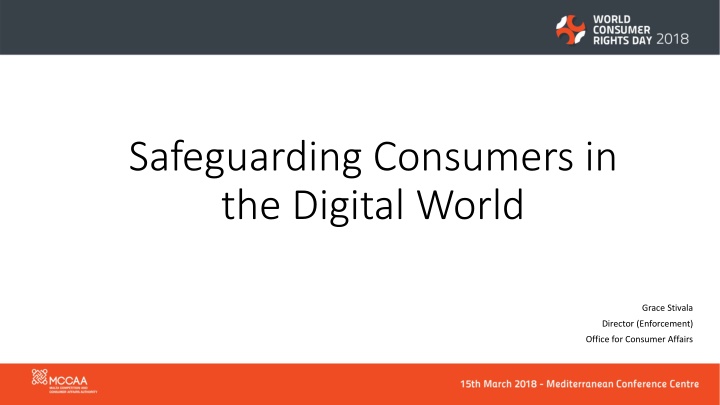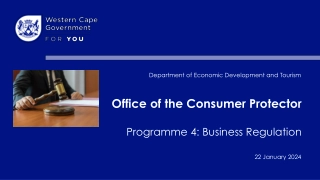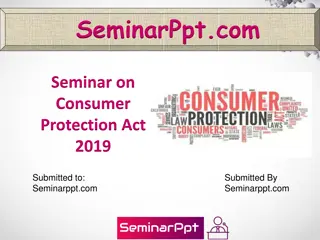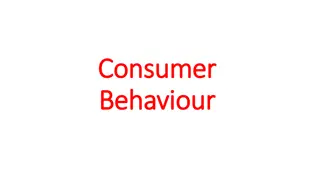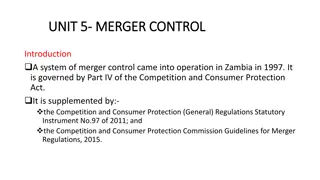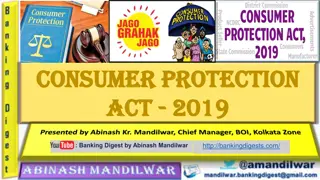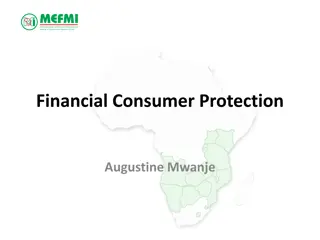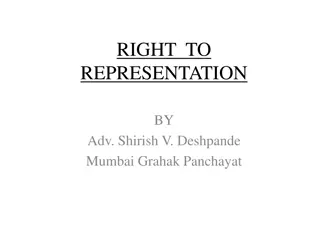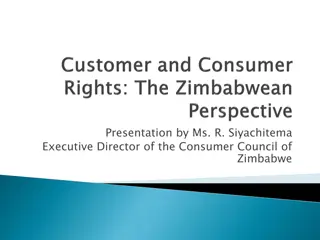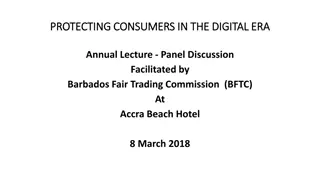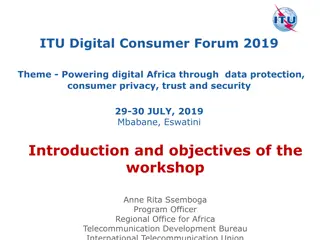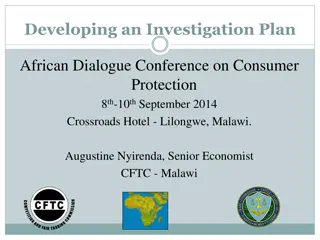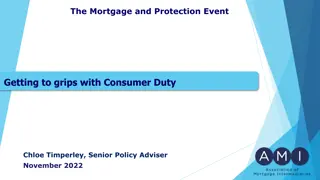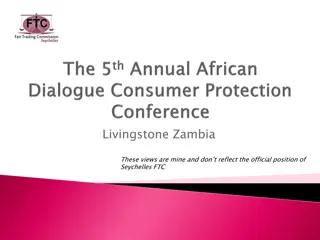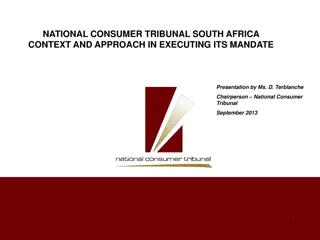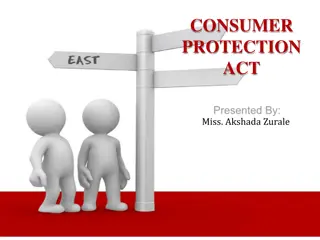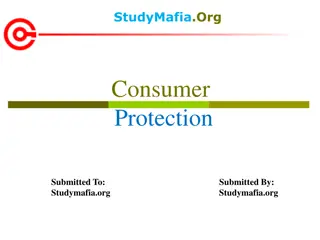Ensuring Consumer Protection in the Digital World
Safeguarding Consumers in the Digital World involves the Office for Consumer Affairs in Malta working to educate consumers, mediate complaints, enforce legislation, and actively participate in the Consumer Protection Cooperation Network established by the European Commission. Through initiatives like the Konsumatur App, the office focuses on online shopping issues and ensures compliance with consumer protection laws, including cross-border cooperation to address breaches and coordinate enforcement efforts.
Download Presentation

Please find below an Image/Link to download the presentation.
The content on the website is provided AS IS for your information and personal use only. It may not be sold, licensed, or shared on other websites without obtaining consent from the author.If you encounter any issues during the download, it is possible that the publisher has removed the file from their server.
You are allowed to download the files provided on this website for personal or commercial use, subject to the condition that they are used lawfully. All files are the property of their respective owners.
The content on the website is provided AS IS for your information and personal use only. It may not be sold, licensed, or shared on other websites without obtaining consent from the author.
E N D
Presentation Transcript
Safeguarding Consumers in the Digital World Grace Stivala Director (Enforcement) Office for Consumer Affairs
Office for Consumer Affairs Information, Education and Research Directorate Disseminates information and creates awareness on the rights and responsibilities of both consumers and traders Complaints and Conciliation Directorate assists consumers and provides mediation between consumers and traders Enforcement Directorate ensures compliance to consumer protection legislation
Our role in the digital world The Konsumatur App Service with a Smile Award Talks, articles and programmes focusing on online shopping and on how consumers can safeguard their financial interests Addresses complaints emanating from online shopping by Maltese residents from local sellers and complaints received through the online dispute resolution platform Carries out enforcement actions relative to online shopping for both tangible goods and services Participates fully in the Consumer Protection Cooperation Network
The Consumer Protection Cooperation Network Regulation (EC) No 2006/2004 on consumer protection cooperation lays down a cooperation framework to allow national authorities in the EU to jointly address breaches of consumer rules when the trader and the consumer are established in different countries The national authorities form a European enforcement network called the "CPC Network" The European Commission coordinates the cooperation between the authorities to ensure that consumer rights legislation is applied and enforced in a consistent manner across the Single Market
How the CPC Network works The Consumer Protection Cooperation Regulation sets a list of minimum powers to ensure a smooth cooperation Any authority in a country where consumers' rights are being violated can ask its counterpart in the country where the trader is based to take action to stop this breach of law The CPCS is the IT Tool established to facilitate cooperation and to provide a structured and secure communication channel for the exchange of information between public enforcement authorities Authorities can also alert each other about malpractices that could spread to other countries Authorities, with the Commission's support, can also coordinate their approach to applying consumer protection law so as to tackle widespread infringements
EU Wide Screening of websites (Sweeps) A sweep is a set of checks carried out simultaneously by national enforcement authorities to identify breaches of EU consumer law in a particular sector Sweeps operate in a two-step action process, comprising of a coordinated sweep action and the enforcement phase In the enforcement phase, the authorities ask the traders concerned to take corrective action
2014 Sweep Commercial and Legal Guarantees 437 websites selling electronic goods were checked out of which 235 were found to be infringing EU Consumer law Main issues identified: insufficient information about the legal guarantee lack of accessibility or transparency of conditions of the commercial guarantee
2015 Sweep Pre-contractual information as regulated by the Consumer Rights Directive 743 websites were checked and irregularities were confirmed in 436 cases. The majority of these cases were corrected. Main issues identified: poor information on the right to withdraw from a transaction incomplete or unclear details about the trader failure to provide clear information of price or contract conditions unclear information on product or service characteristics
2016 Sweep Screening of travel comparison and booking websites 352 websites comparing offers and prices, mainly in the travel sector were checked. 117 were flagged for further investigations. The majority of these cases were corrected and some are still ongoing. Main issues identified: irregularities related to the price and the way it was calculated and presented limited information on the identity of the provider of the comparison tool unclear or non-transparent information on the user review process lack of information on the comparison criteria
Joint Actions In-app purchases (2013) Main problems identified: games advertised as free direct exhortations to children payment arrangements email address of traders Google and Apple made a number of engagements to address the above problems. This action increased consumer confidence in the fast-growing "app" sector
Joint Actions Social Media (2016) Duty of social media operators to provide an email address and to cooperate with consumer protection authorities Notice and action procedure Fairness or lack of clarity of some "Standard Terms" Jurisdiction, applicable law clause and waiver of mandatory consumer rights Failure to identify commercial communications Consumer's obligation to indemnify the provider and waiver by the provider of all liability Removal of user generated content Power to unilaterally change terms and conditions Power to unilaterally determine the scope and application of the terms and conditions
Joint Actions Social media operators specifically agreed to implement the changes to their terms in all language versions in the first quarter of 2018: the terms of services limiting or totally excluding the liability of social media networks in connection with the performance of the service; the terms requiring consumers to waive mandatory EU consumer rights, such as their right to withdraw from an on-line purchase; the terms depriving consumers of their right to go to court in their Member State of residence, and providing the application of California law; the term releasing the platform from the duty to identify commercial communications and sponsored content
E-Enforcement Group Set up in 2013 to address the rapidly evolving commercial practices and business models in e- and m-commerce such that e-enforcers are able to detect new trends in time, keep pace with technical and internet law developments and share knowledge quickly. The CPC e-enforcement group s areas of work are: Horizon scanning Best Practice Training Knowledge exchange
E-Enforcement Academy a branch of the e-enforcement group an e-learning service to support the knowledge and capacity building in internet investigations keeps the users informed about the challenges of ecommerce, develop digital skills and create common tools and methods to improve the online market surveillance and enforcement actions in the digital single market. a whole community of colleagues and experts ready to share their views, experiences and discuss the new online trade challenges. Knowledge webinars, e-learning webinars, basic and advanced coaching webinars, Internet Researcher s Manual, Master Classes and assistance
New CPC Regulation New minimum investigative and enforcement powers, including: the power to purchase goods or services as test purchases, where necessary, under a cover identity the power to remove content or to restrict access to an online interface or to order the explicit display of a warning to consumers when they access an online interface; the power to order a hosting service provider to remove, disable or restrict access to an online website The power for European Consumer Centres, consumer organisations and associations, and where appropriate trader associations to issue external alerts.
New upcoming package proposal New Deal for Consumers aimed at ensuring cheaper and more effective means to stop and remedy breaches harming multiple EU consumers simultaneously Two legislative acts: A Directive introducing targeted amendments to several substantive consumer law Directives A Directive amending and replacing the 2009 Injunctions Directive, with a view to including elements of collective consumer redress.
THANK YOU grace.stivala@mccaa.org.mt
